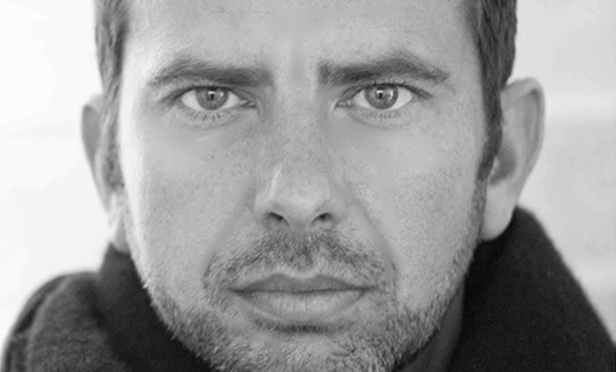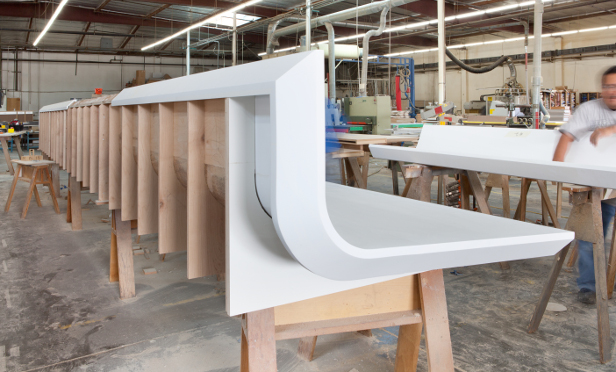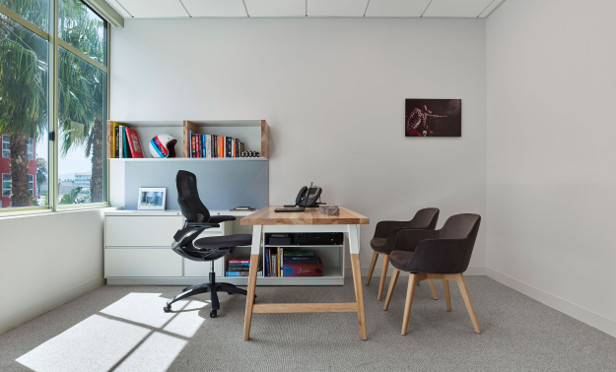
ANAHEIM, CA—In order to present a consistent image that will also attract and retain talent, modern companies are turning to customized furniture that matches their brand, MASHstudios and MASHindustries founder and principal Bernard Brucha tells GlobeSt.com. MASHstudios and its manufacturing division MASHindustries have created customized and branded office furniture for high-profile companies such as Google, Uber, Tinder, HBO, the Honest Co. and Facebook, tailoring the product to each firm's specific needs and speaking to each one's individual style.
Additionally, the company has unveiled the MASHstudios Design Campus in Downtown L.A., a space with a start-of-the art design studio and a 5,000-square-foot showroom that acts as a design incubator where designers, textile specialists, manufacturers and engineers work in tandem.
We spoke with Brucha about how furniture adds another nuance to the trend of companies branding themselves with their office space.

GlobeSt.com: How does customized and branded office furniture fit in with all of the changes happening in the office real estate sector?
Brucha: There are a couple of ways we've seen it fit in immediately, mainly with bringing in new talent and recruiting people. The companies trying to bring in top talent have been our top supporters. By customizing or branding their environment to their own brand and making the office feel a little bit more like home, they're able to offer to their prospective employees a lot more in terms of comfort and wellness in their spaces. They're getting people to stay in their offices a little bit longer by creating a more relaxed environment. We always look at that as a more creative environment as well. It's a big win for us.
GlobeSt.com: What does this type of furniture mean to high-profile companies like Google, Uber, Tinder, HBO and Facebook?
Brucha: These tech companies are selling different products, but they're going about it in very different ways. They're selling technology and what it brings. The products are not too different in reality, but what they're able or trying to do is diversify their brand. The way a company like Uber is looking to their employees and customers is very different from the way Google and Apple are looking at theirs. They're trying to create their own tribes of people, customers and employees. What the customers are seeing outwardly about company, the company is bringing inside, so the outside is matching the inside.
A Google customer thinks of the company as fun and colorful, with a playful environment, and when you walk inside a Google office, you want to see that as well. A company like Uber is trying to express to its clients that it's chic and upscale, so it's office reflects that. It's something we've seen in a lot of clients with whom we deal. They're branding their office so that the outward appearance or image is brought all the way in through the back door of the office. If you're selling this as a company, that mission statement has to flow into every aspect of a business. You can't sell yourself as one view of what you're selling and when you open the front door, you're different. It's a matter of consistency.

GlobeSt.com: When trying to attract and retain talent, how should companies think about the aesthetics and function of their furniture?
Brucha: Something we're seeing a whole lot of lately is starting off with healthy environment. You can do a lot of different things on a really easy level. For example, ergonomic features on work stations, sit/stand desks. A lot of customers are going to those. Also, nobody just spends eight to 14 hours just sitting at a desk anymore; you have a lot of different work environments where work happens. You can have a private meeting area, a lounge area; you're moving a little bit, and it gives you a little healthier way to work. So, the big one is making an office healthy, but then also trying to figure out who are you trying to attract to your office. What does your office look like? A sporting-goods company doesn't want a whole sea of cubicles, but a more open environment with rustic materials. We're able to bring that materiality in through the furniture as well. Patagonia's office looks like a Patagonia store. Candidates will interview with many companies, and if you're able to appeal to who that person is, they will be happier in their environment as well as more productive.
GlobeSt.com: What else should our readers know about this topic?
Brucha: For us, it started by working in the tech sector. We were the first ones to realize that for these companies to grow and attract, they had to scale up quickly. That has since permeated to a lot of different sectors for us—fashion, banks, law firms—the idea being that everybody is having to up their game a little bit. It's a tight market out there. The fact that I can walk into a client's office and show them what we can do, and the owner lets out a long sigh and says, “I had no idea this was happening,” and we put them back on the right path and turn the ship around means that we're doing some good in the world.
© Touchpoint Markets, All Rights Reserved. Request academic re-use from www.copyright.com. All other uses, submit a request to [email protected]. For more inforrmation visit Asset & Logo Licensing.






